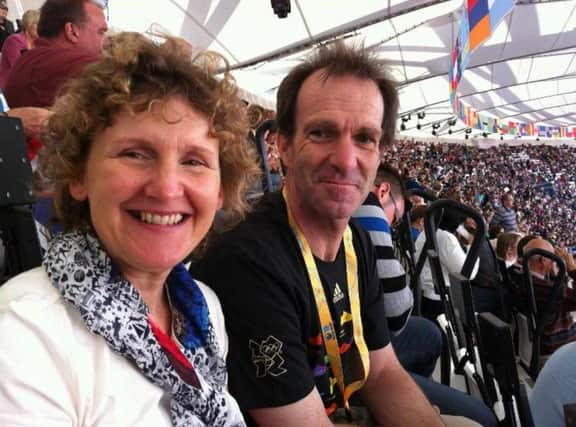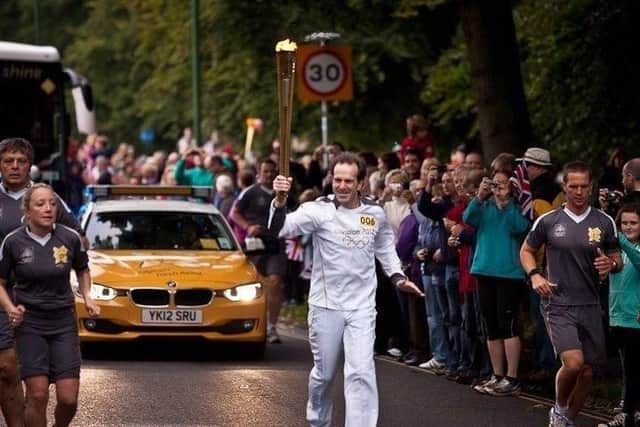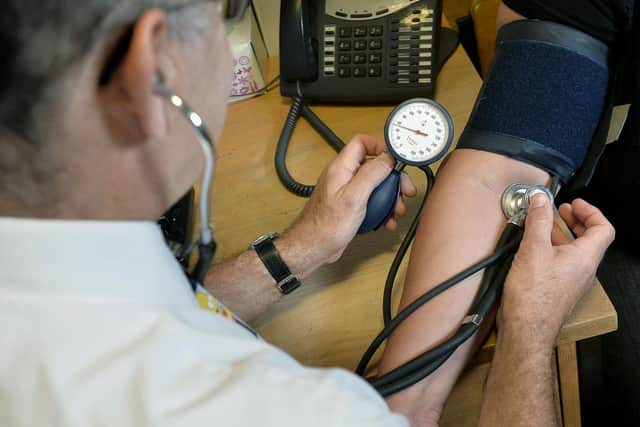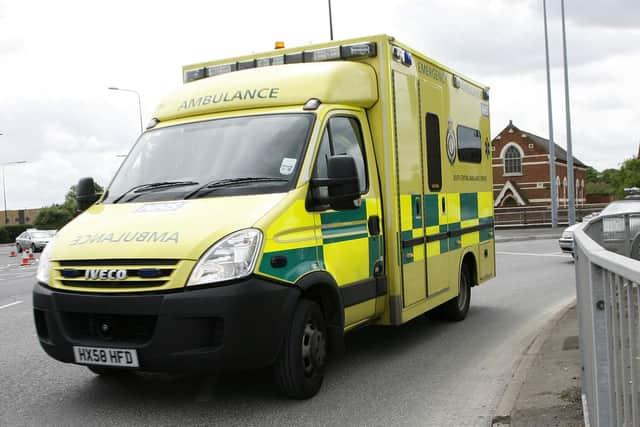Portsmouth man who almost died of a stroke after years urges others to cut down on stress


Despite living a healthy lifestyle including not smoking and drinking little, Roger had succumbed to something else – stress.
At the time – in January 2017 – his family was told there was 95 per cent chance the 58-year-old would die.


Advertisement
Hide AdAdvertisement
Hide AdDespite the odds Roger, who lives in Portsmouth, survived although his life remains altered forever. The stroke damaged the part of his brain which controls communication and has left him unable to speak or read and write properly.
And he was unable to return to work as a chartered surveyor at a Fareham-based firm.
Now, in line with national stroke prevention day, Roger is calling on others to be wary, as nine out of 10 strokes are linked to lifestyle factors such as smoking, obesity and stress.
‘Just before my stroke I was under a lot of pressure at work,’ he said. ‘If I had known I was at risk of a stroke I would have talked to my boss about the stress I felt and asked for help to reduce it.’


Advertisement
Hide AdAdvertisement
Hide AdAmateur rugby coach and athletics coach Roger was attending a boot camp session when the stroke occurred.
He said: ‘As I exercised this time, I became aware that my vision was becoming skewed and I remember collapsing. The instructor realised I was having a stroke and called an ambulance straight away.
‘If I had decided to stay at home that morning I would not have been so fortunate. I remember the journey in the ambulance but then I have no memory of the next two weeks.’
Roger underwent a three hour operation at Southampton hospital to try and dissolve the clot, which had caused the stroke, but it was unsuccessful. Four days after the stroke he started moving his arms and it looked as though he may be waking up.


Advertisement
Hide AdAdvertisement
Hide AdHe said: ‘The doctors told my family that this was a sign that my brain was shutting down and that it was 95 per cent certain I would die within 24 hours. Somehow, I pulled through and woke up 48 hours later.’
Roger spent seven weeks in hospital and received intensive therapy.
‘After my discharge from hospital I was very grateful for the six months of speech and language therapy that I had from the Community Stroke Rehabilitation Team (CSRT) based at Queen Alexandra Hospital,’ he said.


‘I was referred to Graham Wake from the Stroke Association and he provided invaluable support via his workshops and Communication Support Group.’
Advertisement
Hide AdAdvertisement
Hide AdFurther tragedy struck the family when Roger’s wife Pam died of liver cancer in 2019 at the age of 61.
‘Eighteen months after my stroke my wife was diagnosed with cancer and she died less than a year later,’ he said.
‘My family helped me move to a city centre flat which is close to many public transport options so I can stay connected as I can no longer drive.
‘My daughters Gemma and Kessia, the rest of my family and friends have been an enormous support to me and helped me build a new life.’
Advertisement
Hide AdAdvertisement
Hide AdFor his daughter Gemma the whole experience was an ‘enormous shock.’
The 38-year-old, who lives in West Wittering, said: ‘He was definitely not someone you’d think would have a stroke. He was fit and active and didn’t smoke and didn’t drink much.
‘But we knew he worked really hard in his job. He would often work weekends and he would work extremely hard in the run up to holidays and then have to spend two or three days recovering from a headache.
‘Dad suffered from headaches a lot, migraines were part of his life, but he didn’t think they were that serious.
Advertisement
Hide AdAdvertisement
Hide Ad‘I would tell people to be aware of the impact stress can have on their health because it’s very real. I never realised it myself.
‘It can have serious physical manifestations.’
Since the stroke Roger has worked hard, alongside his family and healthcare workers, to regain some independence.
He said: ‘I have rebuilt my fitness level, despite some pain in my right arm and hand following the stroke, and walk for at least two hours a day as well as taking part in walking football and yoga.
‘A stroke does not have to define you. You can build a new life but it will be different from your life before the stroke.
Advertisement
Hide AdAdvertisement
Hide Ad‘That can be hard to accept but you will find the support to do so from the Stroke Association, family and friends. I take pleasure in every day and enjoy the simple things in life.
‘I would like to help all stroke survivors to see that there is hope after stroke. You can’t go back to how you were before the stroke but with support you can find a fulfilling joyful new life.’
Making small changes could save your life
A CHARITY is urging people to make one small change in their lives to reduce the risk of a stroke.
Measures such as monitoring your blood pressure, quitting smoking and exercising more regularly will put you at lower risk.
Advertisement
Hide AdAdvertisement
Hide AdAccording to a UK-wide survey conducted by the Stroke Association, nine out of ten stroke survivors in the south east said they would go back in time and urge their younger self to make lifestyle changes, which may have prevented their stroke.
And more than four out of five people surveyed say they hadn’t realised that they were at risk of a stroke.
Juliet Bouverie, chief executive at the Stroke Association said: ‘A stroke happens in the brain, the control centre for who we are and what we can do. It can happen at any time and at any age and can be devastating.
‘We know not all strokes are avoidable, but as many as nine out of ten strokes could be prevented as they are linked to things you can change or manage. Many people simply don’t realise they are at risk and that’s something that we as a charity desperately want to put right.’
Advertisement
Hide AdAdvertisement
Hide AdOf the more than 5,000 stroke survivors surveyed, 42 per cent said they would try to reduce their stress levels.
Other changes stroke survivors would have made include:
Monitor blood pressure – 35 per cent
Exercise more – 32 per cent
Eat more healthily – 30 per cent
Lose a set amount of weight – 28 per cent
Stop smoking – 24 per cent
Drink less alcohol – 23 per cent
Monitor high cholesterol – 22 per cent
Reduce salt intake – 17 per cent
Ms Bouverie added: ‘The effects of a stroke can be life-changing for you and your family, so why not do all you can to avoid one yourself?
‘However, we know that it isn't always easy, so pick something that’s manageable for you. Aim to stick with it for an initial three months and if you can do that you’re more likely to form a regular habit.’
Find out more at stroke.org.uk/stroke-prevention-day.
What are the signs of symptoms of someone having a stroke? SIGNS and symptoms of a stroke vary from person to person, but usually begin suddenly, the NHS has said.
Advertisement
Hide AdAdvertisement
Hide AdA stroke occurs when blood supply to part of the brain is cut off.
As different parts of your brain control different parts of your body, your symptoms will depend on the part of your brain affected and the extent of the damage.
The main stroke symptoms can be remembered with the word FAST:
Face – the face may have dropped on one side, the person may not be able to smile, or their mouth or eye may have drooped.
Advertisement
Hide AdAdvertisement
Hide AdArms – the person may not be able to lift both arms and keep them there because of weakness or numbness in one arm.
Speech – their speech may be slurred or garbled, or the person may not be able to talk at all despite appearing to be awake; they may also have problems understanding what you're saying to them.
Time – it's time to dial 999 immediately if you notice any of these signs or symptoms.
It's important for everyone to be aware of these signs and symptoms, particularly if you live with or care for a person who is in a high-risk group, such as someone who is elderly or has diabetes or high blood pressure.
A message from the Editor, Mark Waldron
Subscribe here for unlimited access to all our coverage, including Pompey, for just 26p a day.
Comment Guidelines
National World encourages reader discussion on our stories. User feedback, insights and back-and-forth exchanges add a rich layer of context to reporting. Please review our Community Guidelines before commenting.
